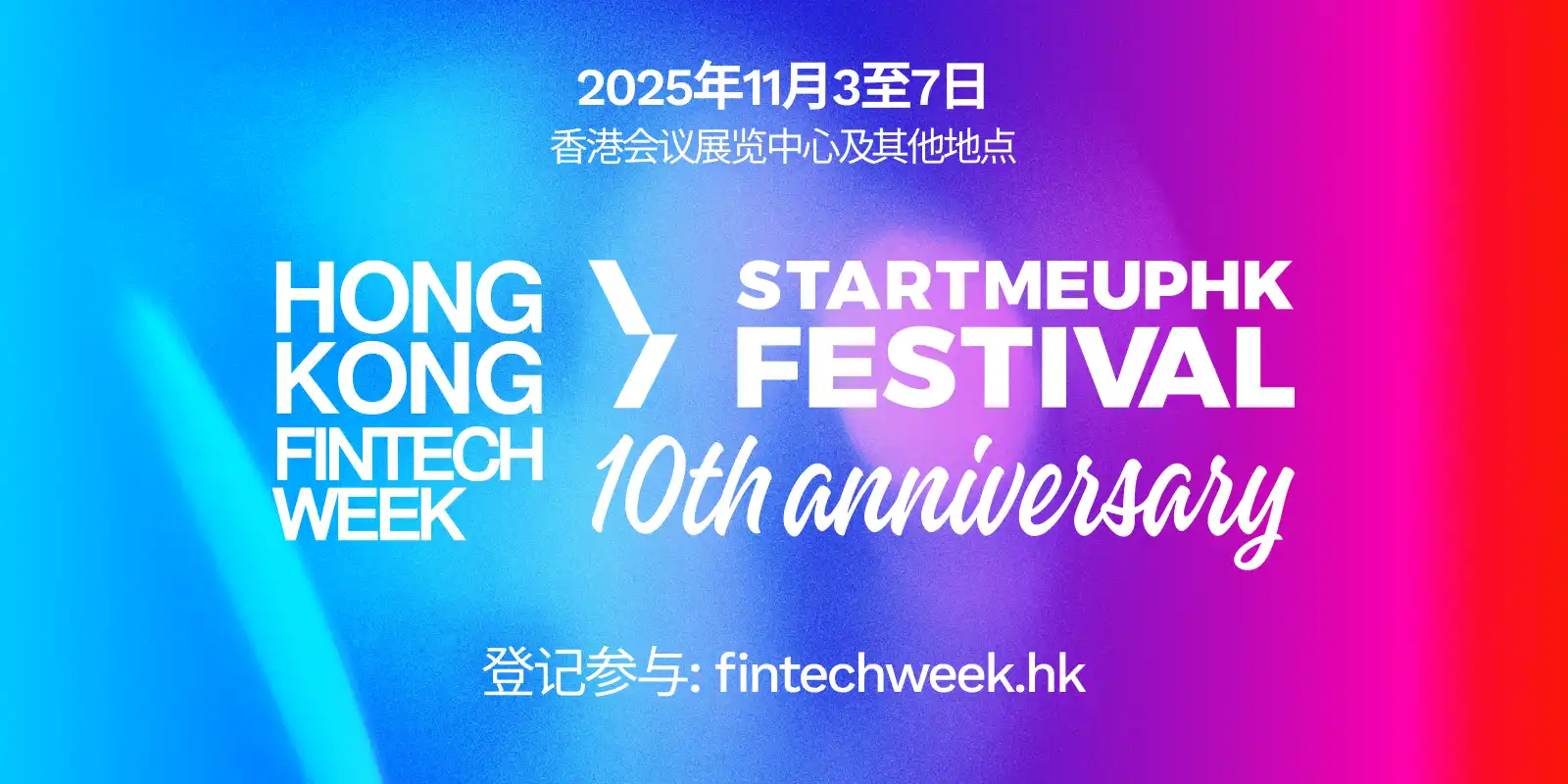Real-time Update | What Are the Hot Topics at Hong Kong Fintechweek 2025?
From November 3rd to 7th, FinTech Week 2025 was grandly held at the Hong Kong Convention and Exhibition Centre.
From November 3rd to 7th, FinTech Week 2025 was grandly held at the Hong Kong Convention and Exhibition Centre. As Asia’s leading fintech event, Hong Kong FinTech Week celebrates its tenth anniversary. This year, the conference will further strengthen its international influence, creating a larger global stage and focusing on and exploring core areas that drive fintech innovation, such as artificial intelligence, Web3, blockchain, digital payments, and digital banking.

Key officials such as Hong Kong Chief Executive John Lee, Financial Secretary Paul Chan, and Deputy Governor of the People’s Bank of China Lu Lei will attend and deliver speeches; industry leaders such as Tencent Vice President Lin Haifeng, Ant Group Chairman Jing Xiandong, Binance CEO Richard Teng, and Meitu founder Cai Wensheng will also take the stage as guest speakers. BlockBeats reporters will provide live coverage from the event. The latest developments are as follows:
Franklin CEO: New business models in the crypto sector will disrupt traditional finance and give rise to great companies
On November 3rd, Franklin Templeton CEO Jenny Johnson stated at Hong Kong Fintechweek 2025 that previously, the crypto world and the traditional financial world were two parallel universes, both large in scale but almost completely non-overlapping. It was like two parallel lines moving forward, and suddenly the situation changed: the traditional financial world began to awaken and integrate with the crypto world, putting financial products on-chain, and clients started to strongly demand access to crypto assets.
For millennials, bitcoin is like their gold. I believe bitcoin itself is an asset, even somewhat like a religion—you either believe in it or you don’t. Franklin is paying close attention to what’s happening in the crypto world, because disruption doesn’t only come from competitors in traditional business, but may also come from the crypto world. Many new business models will emerge in the crypto sector, and I believe the next batch of great companies will come from this field—together with AI companies.
In addition, she revealed that their money market fund is about to announce major news. When asked by the host about the main reason for attending the Hong Kong event, Jenny said: “We are excited about the prospects for money market funds, and have found new demand in many jurisdictions. I think we may make the announcement here in the next two days.”
Eric Yip: Will allow professional investors access to more investment products and build a basic safety net for the digital asset class
On November 3rd, Eric Yip, Executive Committee Member of the Hong Kong Securities and Futures Commission, stated at Hong Kong Fintechweek 2025 that, in addition to the earlier announcement today that local licensed virtual asset trading platforms will be allowed to share global order books with overseas affiliates, the SFC will also allow professional investors access to more investable products. Hong Kong needs to further build financial and AI infrastructure, manage multiple risks, work harder to establish a basic safety net for the digital asset class, and collaborate with global regulators to ensure there is no longer regulatory arbitrage when transferring flows.
Wen Kaiyin: Strengthen fintech cooperation in the Greater Bay Area and enhance internal resource integration
On November 3rd, Wen Kaiyin, Deputy Director of the Guangzhou Local Financial Supervision Administration of Guangdong Province, China, stated at Hong Kong Fintechweek 2025 that Guangzhou has taken the lead in piloting national-level fintech innovation regulation, capital market fintech innovation, blockchain innovation applications, and digital RMB pilots. Since the fintech innovation regulatory pilot was implemented in 2020, Guangzhou has launched 12 fintech innovation projects. The capital market fintech innovation pilot has launched the first batch of 13 pilot projects, ranking first among pilot cities in terms of approval rate.
In the future, Guangzhou will closely cooperate with the Greater Bay Area in fintech, fully leveraging Hong Kong’s high level of financial internationalization, Shenzhen’s vibrant market innovation, and Guangzhou’s strong research institutions. It will strengthen the integration of fintech resources within the Greater Bay Area, increase support for the construction of fintech infrastructure such as data trading and storage platforms and the National Fintech Evaluation Center, and deepen mutually beneficial cooperation in areas such as co-building collaborative fintech innovation platforms and fintech industry alliances. It will reinforce the network synergy effect of core cities in the Greater Bay Area, promoting high-quality development of fintech in the region.
Leung Fung-yee: Hong Kong will allow local licensed virtual asset trading platforms to share global order books with overseas affiliates
On November 3rd, Leung Fung-yee, CEO of the Hong Kong Securities and Futures Commission, stated at Hong Kong Fintechweek 2025 that Hong Kong will allow local licensed virtual asset trading platforms to share global order books with overseas affiliates to improve liquidity.
Eddie Yue: Building next-generation data and payment infrastructure to support industry-wide AI adoption
On November 3rd, Eddie Yue, Chief Executive of the Hong Kong Monetary Authority, stated at Hong Kong Fintechweek 2025 that the Hong Kong fintech development blueprint “Fintech 2030” aims to develop Hong Kong into a robust, resilient, and forward-looking international fintech hub, focusing on four key areas and covering more than 40 specific projects, including:
Building next-generation data and payment infrastructure to support secure, efficient, and scalable data sharing, strengthening cross-border payment connectivity, and creating new opportunities in various areas, such as expanding credit channels for enterprises, promoting trade finance, and providing more personalized financial services and more convenient cross-border remittances for citizens.
Supporting industry-wide adoption of artificial intelligence to further promote comprehensive and responsible AI application in the financial sector in Hong Kong and other regions.
Strengthening business and technological resilience and preparing for the quantum computing era, including developing a new certification framework for fintech cybersecurity, establishing a new early warning system through real-time analysis, and enhancing the robustness and security of the financial system and services.
Promoting financial tokenization and fostering a vibrant tokenization ecosystem. The HKMA will take the lead in demonstrating asset tokenization, such as regularizing the issuance of tokenized government bonds, and will also explore the feasibility of tokenizing Exchange Fund Bills and bonds. The HKMA will soon launch the Ensemble project pilot to support real transactions and continue to work with the industry and other central banks to nurture innovative tokenization use cases.
Standard Chartered CEO: All transactions will eventually be settled via blockchain
On November 3rd, Standard Chartered CEO Bill Winters stated at Hong Kong Fintechweek 2025 that both the bank and Hong Kong SAR leadership believe that all transactions will eventually be settled via blockchain and all currencies will be digitized.
Paul Chan: Stablecoins are not for investment or speculation; license approval only for applicants with robust real use cases
On November 3rd, Paul Chan, Financial Secretary of Hong Kong, stated at Hong Kong Fintechweek 2025 that Hong Kong’s financial regulators have a dual mission: regulation and market development. While encouraging innovation, it is also necessary to ensure the true applicability of digital asset regulation, investor protection, and financial stability. Whether for digital asset trading platforms or stablecoins, we follow the same activity, same risk, same regulation principle. In particular, our regulatory approach to stablecoins is clear: stablecoins are not for investment or speculation, but to facilitate cost reduction, cross-border transactions, and real economic activity. That is why, under the licensing regime, stablecoin license approval is only for applicants with sustainable, robust business models and real use cases.
Jing Xiandong: In the future, AI agents will face customers; AI and blockchain will reshape financial services
On November 3rd, Jing Xiandong, Chairman of Ant Group, stated at Hong Kong Fintechweek 2025 that artificial intelligence and blockchain will reshape financial services. The financial services industry is data-rich and language-intensive. The service of financial products is actually abstract, complex, and credit-based, heavily relying on language description for communication and delivery. This phenomenon covers all areas of finance, from the back office to the customer-facing interface. Therefore, I expect that it may be necessary to assign a dedicated account manager to each customer, and this manager will be an AI agent, to answer questions, solve problems, and provide users with personalized and lowest-cost advice. This is essentially a multi-agent system, an agenda system. This is a short-term change driven by AI technology that we can expect in the financial sector.
In addition, tokenization driven by blockchain technology can convert various assets into on-chain tokens, enabling assets to be traded very transparently and credibly across institutions and markets. We can expect a new payment zone, truly achieving real-time global payments, which will benefit global trade and improve settlement efficiency. This change will bring more regulated innovation sectors and more participation from regulators. Transactions on the blockchain are beginning to shift from speculation to value exchange, and changes in financial services will be driven by blockchain.
Lu Lei: Using digital RMB to explore new cross-border payment solutions and building a dual platform of blockchain and digital assets
On November 3rd, Lu Lei, Deputy Governor of the People’s Bank of China, stated at Hong Kong Fintechweek 2025 that looking to the future, digital RMB will be used to explore new cross-border payment solutions. The three principles of losslessness, compliance, and interoperability have become the basic principles for building legal digital currency infrastructure. The People’s Bank of China is actively working with all parties to explore open, inclusive, and innovative cross-border payment solutions to empower high-quality development of the digital economy.
First, promote multilateral central bank digital currency bridge cooperation to explore new paradigms for cross-border payments. The People’s Bank of China and the Hong Kong Monetary Authority, among other monetary authorities, have jointly explored and formed a multilateral cooperation model based on the multilateral central bank digital currency bridge, using equal governance of central bank contracts and blockchain architecture to connect payment systems and legal digital currency systems of various economies, achieving multi-currency, second-level straight-through cross-border payments.
Second, rely on the digital RMB cross-border payment platform to provide solutions for central bank digital currency cross-border payment cooperation. The People’s Bank of China provides a bilateral cooperation model based on the digital RMB cross-border payment platform, flexibly supporting cross-border interconnection with the systems of various monetary authorities and enabling intelligent digital experiences in cross-border consumption, trade, and investment and financing.
Third, build a dual platform of blockchain and digital assets to activate a new engine for the value internet. The People’s Bank of China has launched the digital RMB blockchain service platform and the digital asset platform. Through the interaction of these two platforms, under the premise of homogeneous regulatory risk control, it is possible to explore asset digitization innovation that enhances regulatory efficiency and penetration, improves the efficiency and transparency of value circulation, and promotes the efficient flow and optimal allocation of economic factors, empowering the value internet.
John Lee: Hong Kong encourages more investors to enter fintech, accelerating innovation and technological transformation
On November 3rd, Hong Kong Chief Executive John Lee stated in his opening speech at Hong Kong Fintechweek 2025 that Hong Kong currently has more than 1,200 fintech companies, an increase of 10% over last year. It is expected that by 2032, the total revenue of Hong Kong’s fintech industry will exceed $600 billion, with an annual growth rate of over 28%. In the first nine months of this year, IPO fundraising in Hong Kong exceeded $23 billion. The Hong Kong Capital Investment Entrant Scheme will be relaxed to encourage more investors to enter the fintech sector. Hong Kong is also exploring tokenization in conventional finance and applying regulatory sandboxes to promote innovation and prudent risk management. Hong Kong is accelerating innovation and technological transformation, focusing on key areas such as artificial intelligence, life and health sciences, and new energy, aiming to help emerging industries achieve scale and prosperity.
Disclaimer: The content of this article solely reflects the author's opinion and does not represent the platform in any capacity. This article is not intended to serve as a reference for making investment decisions.
You may also like
Solana Consolidates Above $177 Support as Market Watches $200 Breakout Level

BTC Dominance Faces 60% Barrier Before Next Halving Cycle

PEPE Consolidates Near $0.0566 With Market Watching Key Support and Resistance Levels

Shiba Inu Holds $5.7B Market Cap as Price Stabilizes Near Key Support

